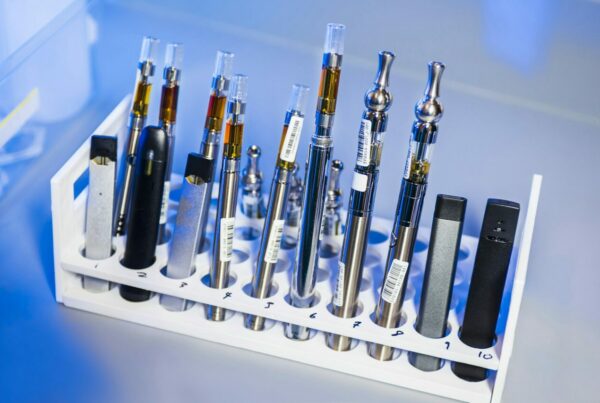N, N-Dimethyltryptamine (DMT) is a compound commonly found in both plants and animals, known for its intense yet short-lived psychedelic effects when taken.
There’s a growing pool of evidence suggesting that DMT, which occurs naturally in the body, plays vital roles in both the peripheral and central nervous systems, possibly acting as a neurotransmitter.
DMT can bring about strong psychedelic experiences, but it generally doesn’t lead to many negative effects, with the exception of potential cardiovascular problems when administered in large doses via injection.
Let’s explore DMT and its diverse roles, from its use for recreational purposes to its promising potential in scientific research and therapeutic treatments.

DMT: A Brief Introduction
| Aspect | Description |
| Name | N, N-Dimethyltryptamine (DMT) |
| Classification | Indole alkaloid |
| Occurrence | Naturally found in a variety of plants and animals |
| Psychoactive Effects | Produces brief, intense psychedelic experiences when ingested. |
| Method of Consumption | Can be smoked, injected, or consumed orally. |
| Duration of Effects | Effects typically last between 5 to 30 minutes. |
| Chemical Structure | Features a tryptamine core with two methyl groups attached to the amine nitrogen atom. |
| Metabolism | Rapidly metabolized by the body, broken down by monoamine oxidase (MAO). |
| Cultural Use | Traditionally used in various ceremonial and shamanic practices by indigenous cultures. |
| Other names | Dimitrifantasiabusinessman’s tripBusinessman’s special45-minute psychosisspiritual molecule |
The Role of DMT in Mental Health
N, N-Dimethyltryptamine (DMT), famed for its potent psychedelic effects, is garnering attention for its potential benefits to mental health. Apart from its conventional reputation for inducing vivid visionary experiences, recent research suggests a correlation between DMT and mental well-being.
Influence on Psychological and Emotional Well-being
DMT, a known psychedelic, is recognized for eliciting deep emotional responses and altering states of consciousness. This ability could potentially pave the way for new therapeutic strategies to overcome mental health challenges, aid emotional processing, and provide fresh perspectives on personal traumas.
Brain Function and Neuroplasticity
Research suggests that DMT could influence neuroplasticity, thereby enhancing the brain’s ability to adapt and reorganize. Investigating its impact on synaptic plasticity and neural connectivity may provide potential treatments for disorders stemming from neural misalignments.
Possible Therapeutic Use in Mental Health Disorders
Early research underscores the potential of DMT in addressing conditions such as depression, addiction, and PTSD. Its ability to induce mystical or spiritual experiences may offer a novel approach to psychotherapy and aid in restructuring negative thought patterns.
The study of DMT’s natural prevalence within the body suggests its critical role in mental health resilience, stress response, and overall psychological wellness. Understanding how the body controls internal DMT levels might lead to the development of new therapeutic strategies.
DMT’s Role in Mental Health Disorders
| Mental Health Disorder | Description | DMT’s Potential Effectiveness | Potential Benefits |
| Depression | A mood disorder marked by persistent sadness, loss of interest, and diminished motivation | Initial research suggests that DMT could alleviate symptoms by inducing deeply emotional experiences. | DMT’s rapid onset and ability to spark transformative experiences may provide innovative ways to restructure negative thinking patterns and enhance emotional processing |
| Post-Traumatic Stress Disorder (PTSD) | A mental health condition triggered by traumatic events, resulting in flashbacks, severe anxiety, and intrusive thoughts | Preliminary studies hint at DMT’s potential to manage symptoms by inducing spiritual or mystical experiences, which could help patients reframe traumatic memories | DMT’s capacity to induce altered states of consciousness may aid in facilitating emotional processing and offering a new perspective on traumatic experiences |
| Addiction | A complex disorder characterized by compulsive engagement in rewarding stimuli in spite of detrimental consequences | Some research suggests DMT’s potential to interrupt addictive patterns and curb cravings for substances | DMT’s ability to trigger intense and transformative experiences could help individuals change their behavioural patterns and confront their addiction issues |
Approach to Utilizing DMT
DMT, known for provoking short but intense psychedelic experiences, can be utilized in multiple ways. The chosen method often hinges on the desired strength and length of the experience.
Inhalation:
When DMT is inhaled, either by smoking in a pipe or vaporizing, it is crucial to monitor the temperature to prevent overheating and burning of the compound. The psychedelic experience starts almost instantly when DMT is inhaled, generally lasting between 5 to 15 minutes.
Oral Consumption:
Taking DMT orally leads to a slower onset of effects that are considerably longer-lasting, often for several hours. This is due to the slower metabolization of DMT when combined with an MAOI.
Injection:
DMT can be directly injected into the bloodstream for immediate and intense effects.
This method results in a rapid and potent experience, but it requires precise dosage and carries greater risks.
Insufflation (Snorting):
Snorting DMT results in a slower onset of effects compared to inhalation but could provide a longer-lasting experience.
Sublingual or Buccal Administration:
When absorbed through the oral mucosa, this method offers an alternative to inhalation and provides a longer, though less intense, experience.
Determining Therapeutic Dosage: N, N-Dimethyltryptamine (DMT)
For inhalation, the suggested dosage is between 20 to 40 mg, while for intravenous use, the recommended dosage is 0.2 to 0.4 mg per kg of body weight. These dosage recommendations are primarily intended for clinical research and are especially pertinent for intravenous use.
- Higher doses administered intravenously are associated with intense visuals, temporary loss of control, and a mixed state of anxiety and euphoria
- Intriguingly, lower doses have exhibited less desirable effects
- Recreational doses of inhaled DMT generally range from 40 to 50 mg, sometimes even reaching up to 100 mg
- Different doses of intravenous Users of DMT (with dosages of 7, 14, 18, and 20 mg) have reported near-death experiences and a significant and lasting enhancement in their psychological well-being.
Availability of DMT Products
Osmosis – 4-ACO-DMT Ethereal Essence Tincture
This tincture is promoted to contain 4-Acetoxy-N, N-dimethyltryptamine (4-AcO-DMT), a version of DMT. Tinctures are liquid extracts designed for oral consumption, and this specific product may offer a distinct experience compared to regular DMT.
Lucid Supply Co. – 5-MeO DMT Vaporizer
This product is a vaporizer that delivers 5-Methoxy-N, N-dimethyltryptamine (5-MeO-DMT). It’s renowned for its potent, transformative, and often brief experiences, with 5-MeO-DMT as its active component.
Integral Alchemist – Acacia – 1ml DMT Vape Cartridge
The Integral Alchemist’s DMT vape cartridge is pre-filled with N, N-Dimethyltryptamine. This product is likely intended for those who favor a subtle and convenient way of consuming DMT.
Deadhead Chemist – 5-Meo-DMT Cartridge
This cartridge houses 5-Methoxy-N, N-dimethyltryptamine (5-MeO-DMT), a substance known for its deep and powerful effects.
Potential psychological benefits may be linked to personal growth, spiritual experiences, or therapeutic applications aimed at improving emotional health.
Deadhead Chemist – N, N DMT Cartridge
Another offering from Deadhead Chemist, this cartridge contains the traditional N, N-Dimethyltryptamine. Cartridges provide a user-friendly means of DMT consumption, guaranteeing a more consistent and manageable experience.
Concluding Remarks
The application of N, N-Dimethyltryptamine (DMT) in
What are the potential implications of using DMT for mental health?
Mental health therapy offers an intriguing yet complex journey. The ability of certain compounds to induce intense but brief psychedelic experiences opens the door to innovative therapeutic methods.
Early studies hint at its potential role in emotional processing, personal development, and possibly
The profound influence of mental health therapy requires careful consideration and responsible usage.
For those keen on responsibly exploring DMT products, reliable sources like Deadhead Chemist Canada Online Dispensary can provide advice and a variety of options.
Frequently Asked Questions:
How do different DMT products affect mental health?
For instance, vaporizers may yield rapid effects, whereas tinctures or vape cartridges might provide more controllable and steady doses.
Incorporating derivative compounds or 5-MeO-DMT can result in varying intensities and different types of mental health effects.
These nuanced differences underscore the importance of selecting a DMT product based on individual preferences and mental health goals.
Can DMT induce long-term changes in mental health and personal growth?
There are anecdotal accounts suggesting that DMT-triggered experiences could lead to enduring improvements in mental health and personal development.
Profound or life-altering experiences, such as ones similar to near-death experiences, are often associated with reports of ongoing positive changes in psychological health and personal development.
While these experiences are intense and transient, they can often prompt self-reflection, spiritual revelations, and a sense of unity or enlightenment.
Individuals often report a refreshed perspective on life, enhanced emotional resilience, and a heightened appreciation for life following these experiences.
What is the recommended method for using DMT for mental health purposes?
Making informed choices, including thorough research and understanding the effects of the compound, is essential.
Advice from mental health professionals or experienced users can provide valuable insights into potential risks and advantages.
Recognizing personal tolerance and mental preparedness is also critical, as is ensuring a supportive and safe environment for the experience.
How does DMT stack up against other psychedelics like psilocybin or LSD in mental health therapy?
DMT stands apart from other psychedelics such as psilocybin or LSD in terms of effects, duration, and intensity.
Its brief duration results in unique experiences of high intensity, which require distinct therapeutic strategies in mental health, as opposed to the approaches used for longer-lasting psychedelics.
Recommended Additional Reading:





